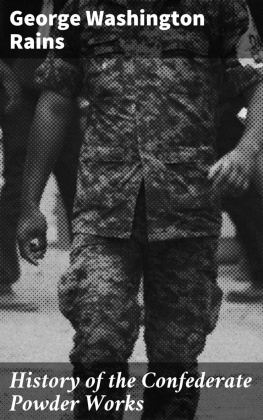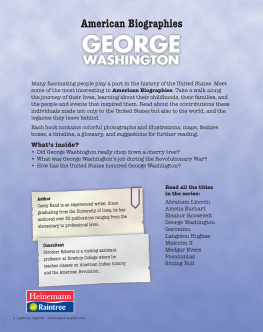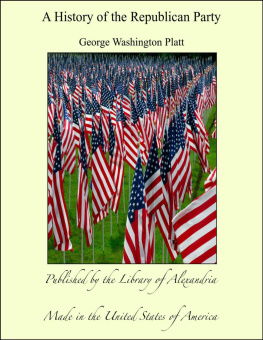[p ]
ADDRESS.
Table of Contents
Fellow Confederate Survivors:
In accepting your invitation to address you on the general history of the Confederate Powder Works, I do so with some hesitation, on account of my close personal connection with a subject which absorbed my thought, time and energies.
In the history of a war we find, generally, but little reference to the manufactories engaged in the preparation of material; they had been previously established, and were in active operation before its commencement, their products being immediately available for active operations. An instance can scarcely be found in modern warfare where previous preparations had not been made, and where the necessary manufacturing works did not already exist.
The late war was entered upon unexpectedly. Throughout the Southern country it was supposed that the North would not seriously oppose a secession of the States from the Federal compact, hence no previous provision had been made for such contingency, and no material of war gathered.
Manufactories existed on a very limited scale, and none for war purposes, hence their speedy erection was of extreme importance, and had to be accomplished under the most unfavorable conditions.
The entire supply of gunpowder in the Confederacy at the beginning of the conflict, was scarcely sufficient for one month of active operations, and not a pound was being made throughout its limits. To enter upon a great war without a supply of this essential material, and without effective means of procuring it from abroad, or of manufacturing it at home, was appalling.
No one was so well aware of this condition of things as the President of the Confederate States, who, being an educated soldier, was fully alive to the requirements of war, and at once took active measures for the creation of war material. Among these, was the erection of a great gunpowder manufactory.
It is the custom of the different nations, in addition to the private factories of gunpowder, to have erected at different points national [p ] works to supply the demand for war. The very limited resources of the Confederacy not admitting of division, had to be accumulated at one point. Mr. Davis was necessarily acquainted with most of the officers of the old army, as he was graduated at West Point, served with great distinction in the war with Mexico, and had been Secretary of War under the Federal Government; he was thus enabled to select his agents for the different services required. Thus that very competent officer, General Gorgas, was placed at the head of the Ordnance Department; I had the honor of being appointed to take charge of the manufactory of gunpowder, a carte blanche being given. The necessary works were to be erected as nearly central as practical; to be permanent structures, and of sufficient magnitude to supply the armies in the field and the artillery of the forts and defences.
On the 10th July, 1861, I left Richmond to enter upon this duty. Making a rapid tour through the South to find a suitable site, Augusta was selected, for several reasons: for its central position; for its canal transportation and water-power; for its railroad facilities; and for its security from attacksince the loss of the works would have been followed by disastrous consequences.
The small amount, comparatively, of gunpowder captured with the Navy Yard at Norfolk, with that on hand from other sources, had been distributed to the army gathering on the Potomac, to Richmond, Yorktown, Pensacola, Mobile, New Orleans, and other places; scarcely any being left for the force assembling under the command of General Albert Sidney Johnson, in Kentucky. The Federal forces, having the requisite advantages for equipment and transportation, were assembling in large bodies, and the utmost energy was required to prevent the loss of a battle by failure in ammunition. General Johnsons command was the most urgent in its wants, hence required the first attention.
The State of Tennessee, through the energy of Governor Harris, and its Military Committee consisting of General Harding and Colonel Bailey, had at the earliest moment taken measures to supply his army by making contracts for saltpetre, to be supplied from the limestone caves, and with the Sycamore Powder Mill, not far from Nashville, which was to be enlarged and put into immediate operation. These contracts were turned over to the Confederate Government on my arrival in that city, and every assistance possible given [p ] by the State authorities. Mr. S. D. Morgan, a private citizen of Nashville, but a gentleman of great energy and influence, rendered essential service to the officers of the Confederacy. The Sycamore Stamping Mill was soon put into operation, but its limited arrangements, particularly for preparing the saltpetre, caused the product to be small. Notwithstanding the rapid construction of new stampers, and other parts, it was only in the latter part of September that five hundred pounds of powder daily were produced.
It was soon perceived that to increase the supply, a special refinery for saltpetre would have to be erected; works accordingly were projected, commenced, and mainly completed, at Nashville, by the 9th October, on which day 1,500 lbs. were refined, and this amount was gradually increased to 3,000 lbs. daily. Experts were not to be found, and for some days every part of the operations were carried on under my personal instruction.
Gunpowder contains three-fourths of its weight of saltpetre, and to have its proper and enduring strength, this constituent must be refined to almost chemical purity. Thus the obtaining of this material and its preparation, became matters of the highest consideration.
The Governor of Georgia, at the suggestion of Lieutenant Boggs, late of the Ordnance Department of the old army, had purchased a small cargo of saltpetre and sulphur in Philadelphia, which fortunately arrived safely at Savannah just before that port was blockaded. This store of material, although comparatively small, was of extraordinary value, as from it mainly the gunpowder for General A. S. Johnsons army was supplied, as well as the Batteries at Fort Pillow, Island Number 10, and Memphis, on the Mississippi river.
The earth of the limestone caves of Tennessee, Alabama, Georgia, Arkansas, and other States, was rich in nitrate of lime, and this salt was convertible into saltpetre by lixiviation and saturating with the lye of wood ashes. Some of these caves were personally visited, and great efforts made to have them worked to full capacity. Agents were sent out to investigate their capabilities with authority to make contracts, and supply the necessary information for their working; the last was accomplished by means of a pamphlet which I published in Nashville giving detailed instructions, and which was distributed throughout the country; it was republished in Richmond, New Orleans and other places. As rapidly as the crude saltpetre was [p ] received from the caves it was refined and sent to the powder mills, and the products mostly sent to General A. S. Johnsons command. About 100,000 pounds of gunpowder were thus supplied before the fall of Nashville, besides a considerable amount sent to New Orleans and other places.
The caves of Arkansas were rich in nitrous earth, and those of Texas still more so, and these supplied the armies west of the Mississippi river with material for gunpowder. As early as practicable I sent out instructed powder-makers to both those States, who under the directions of the military authorities, assisted to put up the necessary powder mills for the Trans-Mississippi department, which after the fall of Nashville was left necessarily to its own resources.










